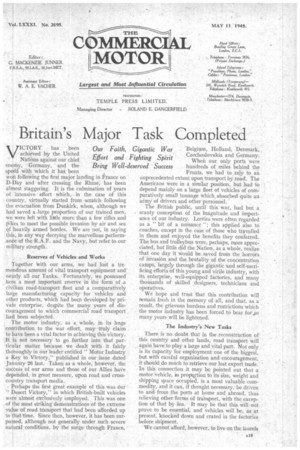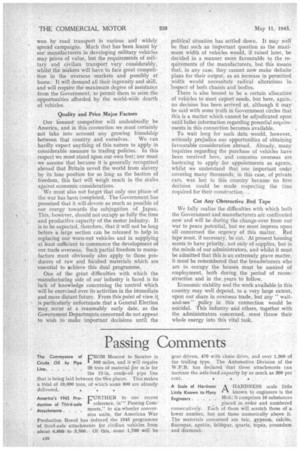Britain's Major Task Completed
Page 21

Page 22

If you've noticed an error in this article please click here to report it so we can fix it.
VICTORY has been achieved by the United Isla-tint-1s against our chief enemy, Germany, and the speed with 'which it has been won following the first major landing in France on D-Day and after, crossing the Rhine, has been almost sta.ggering. It is the culmination of years of intensive effort which, in the case of this country, virtually started from scratch following the evacuation from Dunkirk, when, although we had saved a large proportion of our trained men, we were left with little more than a few rifles and pikes to meet the possible invasion by air and sea 9f heavily armed hordes. We are not, in saying this, in any way decrying the marvellous perform.ance of the R.A.F. and the Navy, but refer to our military strength.
Reserves of Vehicles and Works Together With our arms, we had lost a tremendous amount of vital transport equipment and' nearly all our Tanks. Fortunately, we possessed here a most important rOserve in the forth, of a civilian road-transport fleet and a comparatively large manufacturing capacity for vehicles and other products, which had beo developed by private enterprise, despite the many years of disCouragement to which commercial road transport had been subjected.
The motor industry, as a, whole, in its huge contribution to the war effort, may truly claim to have been a vital factor in achieving this victory. it is not necessary to go further into that particular matter because we dealt with it fairly thoroughly in our leader entitled" Motor Industry a Key to Victory," published in our issue dated January 26 last. Taken as a whole, however, the success of our arms and those of our Allies have depended, in great measure, upon road and crosscountry transport media.
Perhaps the first great example of this was Our " Desert Victory," in which British-built vehicles were' almost exclusively employed. This was one of the most striking demonstrations of the extreme value of road transport that had been afforded up to that time. Since then, however, it has been surpassed, although not generally under such severe natural conditions, by the surge through France, Belgium, Holland, Denmark, Czechoslovakia and Germany. When our only ports were hundreds of miles behind the Fronts, we had to xely to an unprecedented extent upon transport by road. The Americans were in a similar position, but had to depend mainly on a large fleet of vehicles of comparatively small tonnage which. absorbed quite an army of drivers and other personnel.
The British public, until this war, had but a scanty conception of the Magnitude and importance of our industry. Lorries were often regarded as a " bit of a nuisance "; this applied also to coaches, except in the case of those who travelled in them and enjoyed the benefits they conferred. The bus and trolleybus were, perhaps, more appreciated, but little did the Nation, as a whole, realize that one day it would be saved from the horrors of invasion and the brutality of the concentration camps, largely through the gigantic and self-sacrificing efforts of this young and virile industry, with its enterprise, well-equipped factories, and many thousands of skilled designers, technicians and operatives. We hope 4nd trust that this contribution will remain fresh in the memory of all, and that, as a result, the grievous burdens and restrictions which the motor industry has been forced to bear for.so many years will be lightened.
Gigantic War ighting Spirit served Success
The Industry's New Tasks There is no doubt that in the reconstruction of this country and other lands, road transport will again have to play a large and vital part. Not only is its capacity for employment one of the biggest, but with careful organization and encouragement, it should do much to retrieve our lost export blade. In this connection it may be pointed out that a motor vehicle, in proKrtion to its size, weight and shipping space occupied, is a most valuable commodity, and it can, if thought necessary, be driven to and from the ports at home and abroad, thus relieving other forms of transport, with the exception of that by tea. It may be that this will not prove to be essential, and vehicles will be, as at present, knocked down and crated in the factories before shipment. .
We cannot afford, however, to live on the laurels won by road transport in various and widely spread campaigns. Much that has been learnt by our manufacturers in developing military vehicles may pr-ove of value, but the requirements of military and civilian transport vary considerably, whilst the makers will have to face great competition in the overseas • markets and possibly at home. It will demand all their ingenuity and skill, and will require the maximum degree of assistance from the Government, to permit them to seize the opportunities afforded by the world-wide dearth of vehicles.
Quality and Price Major Factors Our keenest competitor will undoubtedly be America, and in this connection we must certainly not take into account any growing friendship between tha,t country and ourselves. We can hardly expect anything of this nature to apply in considerable measure to trading policies. In this • respect we must stand Upon our own feet; nor must we assume that because it is generally recognized abroad that Britain saved the world from slavery ' by its lone position for so long as the bastion of freedom, this fact will weigh much in the scales against economic considerations.
We must also not forget that only one phase of the war has been Completed. The Government has promised that it will-devote as inuch as possible of our energy towards the subjugation of Japan. This, however, should not occupy so fully the time and productive capacity of the motor industry. It is to be expected, therefore, that it will not be long• before a large section can be released to help in replacing our worn-out vehicles and in supplying at least sufficient to commence the development of our trade overseas. Such partial freedom to manufacture must obviously also apply to those producers of raw and finished materials which are essential to achieve this dual programme.
One of the great difficulties with which the manufacturing side of our industry is 'faced is its lack of knowledge concerning the control which will be exercised over its activities in the immediate • and more distant future. From this point of view it.
is particularly unfortunate that a General Election may. occur at a reasonably early date, as the Government Departments concerned do not appear to wish to make important decisions until the political situation has settled down. It may well be that such an important question as the Maximum width of vehicles would, if raised later, be decided in a manner more favourable to the requirements of the manufacturers, but this means that, in any case, they cannot now make definite plans for-their output, as an increase in permitted width would necessitate radical alterations in 'respect of both chassis and bodies.
There is also bound to be a certain allocation of vehicles to Meet export needs, but here, again, no decision has been arrived at, although it may be said with some truth in Government circles that this is a matter which cannot be adjudicated upon until fuller information regarding potential requirements in this connection becomes available.
To wait long for such data would, however, seriously, prejudice our opportunities of obtaining favourable consideration abroad. Already, many inquiries regarding the purchase of vehicles have been received here, and concerns overseas are hastening to apply for appointments as agents, whilst we understand that one important order covering many thousands, in. this case, of private ears, was Last to this country because no firm decision could he made respecting the time required for their construction.
Cut Any Obstructive Red Tape
We fully realize the difficulties with which both the Government and manufacturers are confronted now and will be during the change-over from our war to peace potential, but we must impress upon all concerned the urgency of this matter. Red tape must, if necessary, be cut. At present housing seems to have priority, not only of supplies, but in the minds of our administrators, and whilst it must be admitted that this is an extremely grave matter, it must be remembered that the breadwinners who are to occupy the houses must be assured of employment, both during the period of recon-struction and in the , years to follow.
Economic stability and the work available in this country may well depend, to a very large extent,. upon our share in overseas trade, but any " waitand-see " policy in this connection would be suicidal. This industry and others, together, with the administrators concerned, must throw their whole energy into this vital task.




























































